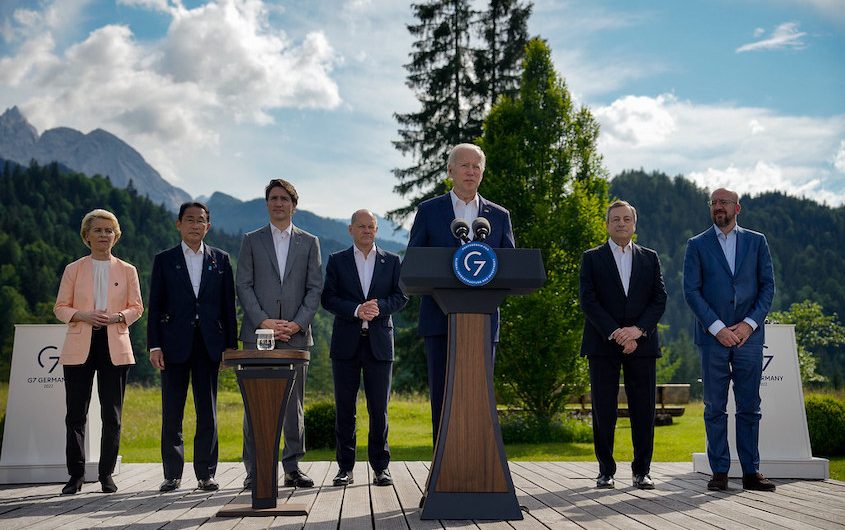
The White House via Flickr
Friendshoring: Democracy or Diversity?

Peter S. Rashish
Vice President; Director, Geoeconomics Program
Peter S. Rashish, who counts over 30 years of experience counseling corporations, think tanks, foundations, and international organizations on transatlantic trade and economic strategy, is Vice President and Director of the Geoeconomics Program at AICGS. He also writes The Wider Atlantic blog.
Mr. Rashish has served as Vice President for Europe and Eurasia at the U.S. Chamber of Commerce, where he spearheaded the Chamber’s advocacy ahead of the launch of the Transatlantic Trade and Investment Partnership. Previously, Mr. Rashish was a Senior Advisor for Europe at McLarty Associates, Executive Vice President of the European Institute, and a staff member and consultant at the International Energy Agency, the World Bank, UN Trade and Development, the Atlantic Council, the Bertelsmann Foundation, and the German Marshall Fund.
Mr. Rashish has testified before the House Financial Services Subcommittee on International Monetary Policy and Trade and the House Foreign Affairs Subcommittee on Europe and Eurasia and has advised three U.S. presidential campaigns. He has been a featured speaker at the Munich Security Conference, the Aspen Ideas Festival, and the European Forum Alpbach and is a member of the Board of Directors of the Jean Monnet Institute in Paris and a Senior Advisor to the European Policy Centre in Brussels. His commentaries have been published in The New York Times, the Financial Times, The Wall Street Journal, Foreign Policy, and The National Interest, and he has appeared on PBS, CNBC, CNN, NPR, and the BBC.
He earned a BA from Harvard College and an MPhil in international relations from Oxford University. He speaks French, German, Italian, and Spanish.
In an April 2, 1917 speech before Congress arguing for U.S. entry into World War I, President Woodrow Wilson famously declared that “the world must be made safe for democracy.” Fast forward to June 10, 1963—not long after the Cuban missile crisis—and President John F. Kennedy made a quite different assertion in his speech to American University: that in the face of the rivalry with the Soviet Union, the aim of U.S. foreign policy should be to “make the world safe for diversity.”
This distinction between democracy and diversity bears increasing importance for the debate about the future shape of globalization—in particular the idea that supply chains should be redirected toward trusted economic partners, what U.S. Treasury Secretary Janet Yellen has called “friendshoring.” Whether it is because of China’s challenge to the rules-based trading system or Russia’s blatant violation of international norms with its invasion of Ukraine, a needed rethink of existing economic linkages is underway.
At the second meeting of the U.S.-EU Trade and Technology Council in May of this year, the two sides pledged to “reduce dependencies on unreliable sources of strategic supply, promote reliable sources in our supply chain cooperation, and engage with trusted partners.” And at the G7 summit in June under the current German presidency, the leaders noted that “recent crises have highlighted systemic vulnerabilities to chronic risks and acute market shocks, affecting our supply chains and economic security.”
But what constitutes a “friend” in international economic relations? If the United States and like-minded European countries took their cue from Wilson, they would organize their trade policy from “the inside out”: because of its domestic institutions, a democracy would inherently be considered a safe trading partner. By extension, an alliance of democracies would be the way to out-compete China and guarantee a free, fair, and secure global economy. That could make the preservation (or expansion) of democratic government around the world an implicit goal of trade policy.
“While a sound strategy requires economic, political, and security concerns to be better integrated in policymaking, it is not in the transatlantic interest for trade policy to become part of a democracy vs. autocracy narrative.”
If, on the other hand, the United States, Germany, and the European Union looked to JFK for guidance, they would take an “outside-in” approach to trade policy. They would start by asking what the trade-offs are in different models of an updated global economic order, what its role should be in a broader national security context, and how to get there.
If they went this route, they would come to the realization that while a sound strategy requires economic, political, and security concerns to be better integrated in policymaking than in the past, it is not in the transatlantic interest for trade policy to become part of a democracy vs. autocracy narrative.
Limiting trading partners to democracies would short-change prosperity for no gain in security. Yes, most democratic governments share U.S. and European strategic economic goals, but so do many non-democratic ones. That’s why Vietnam and Brunei are members of the new Indo-Pacific Economic Framework or why they signed on to the Comprehensive and Progressive Agreement for Trans-Pacific Partnership (CPTPP).
There is a wide diversity (to use President Kennedy’s term) of domestic political and economic systems around the world but what counts is how a country thinks international trade and investment should be regulated. A trading partner should be considered a safe location for friendshoring as long as it maintains an open, high-standard, and rules-based conception of the global economy.








